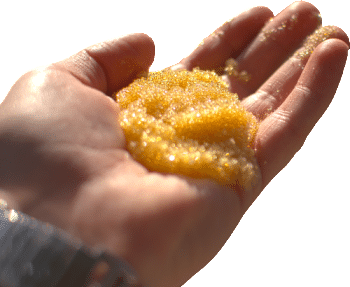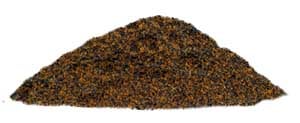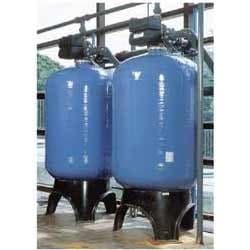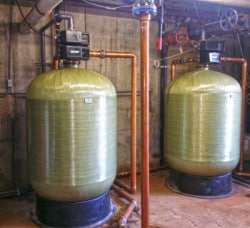
Aqua Clear Water Treatment Specialists manufactures ion exchange water filters and offers service programs for water softening and deionization. In the water treatment industry the two most common forms of ion exchange filters are softening and deionization (DI). Softening is most commonly used as a pre-treatment system in reducing water hardness prior to a reverse osmosis system. A softener system contains resin beads that exchange two sodium ions for every calcium or magnesium ion removed from the incoming hard water, in turn producing soft water. A softener system is a great pretreatment method for removing the salts that could essentially damage the membrane elements of an RO system, causing scale on the membrane surface.

Deionization or DI systems can be an important component of a total water purification system when used in combination with other methods such as reverse osmosis filtration. DI systems effectively remove ions, resin beads exchange either hydrogen ions for cations or hydroxyl ions for anions. The DI resins can be in separate bed exchangers with separate units for the cation and anion exchange beds. They may also be packed in mixed bed exchangers containing a mixture of both types of resins. The deionization resin will remove dissolved inorganics from the water source. Contact Aqua Clear water treatment specialists about our services and ion exchange water filters today.
What is Hard Water?
Untreated water, such as water ‘piped’ into a home or business, also known as tap or city water, has the characteristic of being ‘hard.’ Water is hard when it contains minerals such as calcium and magnesium. Hard water can not only interfere with taste when used for human consumption, but in the case of industrial use can cause issues in downstream equipment such as leaving mineral deposits and frequent cleaning or replacing of filters. Mineral deposits from water are commonly known as limescale.
What is Water Softening?
Water softening is the process of removing or modifying the particles, such as minerals, that make water hard. This is done in two ways: chemistry and filtration. Using chemistry, also known as ion exchange, or deionization (DI), although water does pass through a media ‘filter’ when ion exchange is used, the process is not intended to trap minerals, but passes the minerals along the surface of materials that cause an exchange of ions. Using ion exchange, the minerals are not removed, but modified at a molecular level to no longer cause water hardness. Using filtration, such as reverse osmosis, hard water is moved along a membrane with pores large enough for only water molecules to pass through, leaving behind the hard water particles.
Difference Between Ion Exchange and Reverse Osmosis?
Technically, both ion exchange filtering and reverse osmosis are forms of water softening, however, in many cases ion exchange is used prior to reverse osmosis in a water treatment system to reduce costs and maintenance. Ion exchange is easier and less expensive to maintain as, in simplified terms, it requires only its filter media to be replaced – usually resis beads. Replacing reverse osmosis filters is a more involved process as it requires replacing or cleaning of membranes, pipes and containers. It is common to use ion exchange filtering to remove as many minerals as possible before the water is ‘finished’ in the reverse osmosis process. In many industrial applications, both ion exchange filtering and reverse osmosis are only the first step in a long and complex water treatment system.
Is Reverse Osmosis Required After Ion Exchange Filtering?
No. Depending on the level of water treatment needed, the process can end after the ion exchange process without continuing on to a reverse osmosis, or any other process, before being used for its intended purpose. For example, ion exchange filtering might be the first and only water treatment step when used for human consumption. When water is treated for industrial purposes, there is almost no end to the complexity of both filtering and chemistry needed depending on how the water will be used.
Do I Need to Soften My Water?
There is no simple answer to this question. The easiest way to determine if your water needs to be softened is to reach out to a water treatment specialist. Generally speaking, there are always benefits to softening your water, if nothing else simply to protect your plumbing from limescale, but how to soften your water and to what extent varies greatly from one application to the next.
RODUCTS
Aqua Clear Water Treatment Specialists Twin Water Softener



